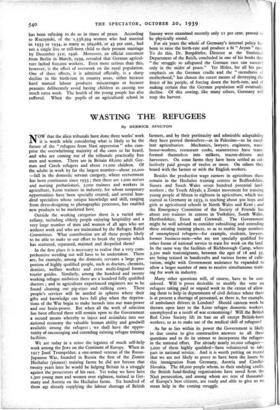WASTING THE REFUGEES
By DERRICK SINGTON
NOW that the alien tribunals have done three weeks' work it is worth while considering what is likely to be the future of the "refugees from Nazi oppression" who com- prise the overwhelming majority of the cases so far heard, and who are coming out of the tribunals practically free men and women. There are in Britain 68,000 adult Ger- man and Czech refugees and about r,000 children. Of the adults in work by far the largest number—about 22,000 —fall in the domestic servant category, where recruitment has been continuous since 1933 ; then there are t,000 nurses and nursing probationeri, 2,000 trainees and workers in agriculture, 8,000 trainees in industry, for whom temporary opportunities have been specially created, and several hun- dred specialists whose unique knowledge and skill, ranging from dress-designing to photographic processes, has enabled new products to be marketed here.
Outside the working categories there is a varied mis- cellany, including elderly people enjoying hospitality and a very large number of men and women of all ages who are without work and who are maintained by the Refugee Relief Committees. What contribution are all these people likely to be able to make to our effort to break the tyranny which has scattered, separated, maimed and despoiled them?
In the first place it is necessary to realise that a very com- prehensive weeding out will have to be undertaken. There are, for example, among the domestic servants a large pro- portion of highly qualified people, such as doctors, chemists, dentists, welfare workers and even multi-lingual former tourist guides. Similarly, among the hundred and twenty working refugee midwives there are a hundred fully qualified doctors ; and in agriculture experienced engineers are to be found cleaning out pig-styes and milking cows. These people's services will be needed in spheres where their gifts and knowledge can have full play when the depriva- tions of the War begin to make inroads into our man-power and our brain-power. But when all the work of selection has been effected there will remain open to the Government a second means whereby to inject and assimilate into our national economy the valuable human ability and goodwill available among the refugees ; we shall have the oppor- tunity of encouraging and extending existing refugee training facilities.
We are today in a sense the legatees of much self-help work among the Jews on the Continent of Europe. When in 1917 Josef Trumpeldor, a one-armed veteran of the Russo- Japanese War, founded in Russia the first of the Zionist Hechaluz (pioneer) training farms he did not foresee that twenty years later he would be helping Britain in a struggle against the persecutors of his race. Yet today we have here 1,300 young men and women over eighteen, trained in Ger- many and Austria on the Hechaluz farms. Six hundred of them ake already supplying the labour shortage of British farmers, and by their pertinacity and admirable adaptability they have proved themselves—as in Palestine—to be excel- lent agriculturists. Mechanics, lawyers, engineers, ware- house-workers, restaurant cooks, seamstresses have trans- formed themselves into milkers, tractor-drivers and harvesters. On some farms they have been settled as col- lectively paid groups of twelve or more. On others they board with the farmer or with the English workers.
Besides the productive wage earners in agriculture there remain in the Hechaluz training centres in Bedfordshire, Sussex and South Wales seven hundred potential land- workers ; the Youth Aliyah, a Zionist movement for training young people of fifteen to eighteen in agriculture, which was started in Germany in 1933, is teaching about 300 boys and girls at agricultural schools in North Wales and Kent ; and the Emergency Committee of the Society of Friends has about zoo trainees in centres in Yorkshire, South Wales, Hertfordshire, Essex and Cornwall. The Government might be well advised to consider subsidising and extending these existing training places, so as to enable large numbers of unemployed refugees—for example, students, lawyers, former business-men—who are not specially qualified for other forms of national service to train for work on the land In the same way the facilities of Richborough Camp, where 3,500 male transmigrants, between the ages of 18 and 35, are being trained in handicrafts and various forms of culti- vation, might with Government assistance be expanded to allow a larger number of men to receive simultaneous train- ing for work in industry.
Many other questions will, of course, have to be con- sidered. Will it prove desirable to modify the veto on refugees taking paid or unpaid work to the extent of allow- ing them to help in departments of civil defence where there is at present a shortage of personnel, as there is, for example, of ambulance drivers in London? Should canteen work be thrown open later to the 8,000 refugee domestic workers, unemployed as a result of war economising? Will the British Red Cross Society lift its ban on all except British-born workers, so as to make use of the medical skill of refugees?
As far as lies within its power the Government is likely in due course to give constructive answers to all these questions and to do its utmost to incorporate the refugees in the national effort. For already nearly 20,000 refugees- 5,000 of them highly qualified—have volunteered to take part in national service. And it is worth putting on record that we are not likely to prove to have been the losers by this immigration from Germany, Austria and Czecho- Slovakia. The 68,000 people whom, to their undying credit, the British fund-finding organisations have saved from the 'Nazi persecution, and among whom are tens of thousand; of Europe's best citizens, are ready and able to give us no mean help in the coming struggle.












































 Previous page
Previous page